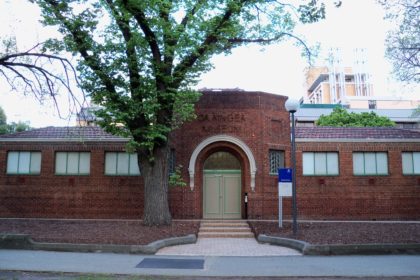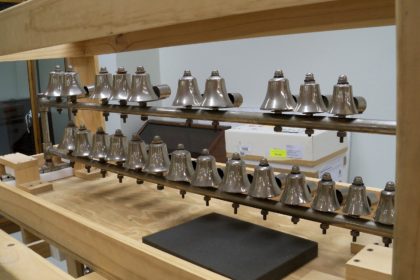-Percy Grainger
“the composer has wished to express the devil-may-care dare-deviltry of the cattle-raiding, swashbuckling English and Scottish borderers of the period so grimly yet thrillingly portrayed in the border ballads collected and published by Scott, Motherwell, Jamieson, Johnson, Buchan, Kinloch, Swinburne and others.”
The World Premiere of Percy Grainger’s Lads of Wamphray Ballad, arranged for Wind Ensemble and SATB chorus by Chalon Ragsdale
Performed by: University of Arkansas Wind Ensemble – Dr. Chris Knighten, director
University of Arkansas Collegiate Chorale – Drs. Stephen Caldwell and Jeffrey Murdock, directors
Soloists: Morgan Cavanah, soprano
Judd Burns, tenor
John Lackey, bass
Conducted by Stephen Caldwell
Recorded at the Faulkner Performing Arts Center
Fayetteville, Arkansas, April 23, 2018
The ballads that Australian-American pianist and composer Percy Grainger was so enthralled by were the “Border Ballads” of Sir Walter Scott (1771-1832). The Ballads were published in Scott’s The Minstrelsy of the Scottish Border in 1802, and Grainger would have had a variety of motivations to work with the material.
In the summer of 1900, an eighteen-year-old Grainger and his mother, Rose, took a vacation to Scotland. Grainger was at the time a student at the Hoch Conservatory in Frankfurt. The trip, intended primarily as rest and recuperation for Rose, was funded by their friend and his composition teacher, the lithographer Karl Klimsch. Scotland affected Grainger deeply. He later described this trip as “the most important single artistic influence” of his life (Bird, Percy Grainger, p. 46). Grainger’s Hillsongs, which he considered his greatest compositions, were started the next year.
Grainger was motivated by an appreciation for the work of Scott, but also by a desire to promote the music and cultures of Northern European countries, as he felt that the cultures of the Northern European countries were being smothered by the cultural influences of Germany, Italy, Austria and France. Grainger, and a cadre of other British musicians, were determined to promote British accomplishments in art, particularly those accomplishments, like The Lads of Wamphray, from the “pre-Bach” era.
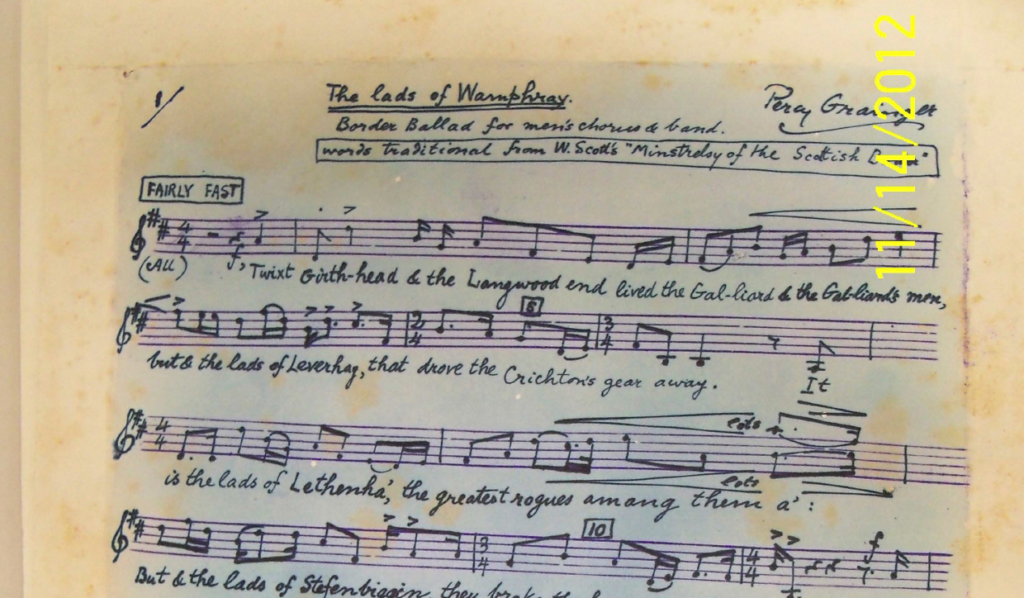
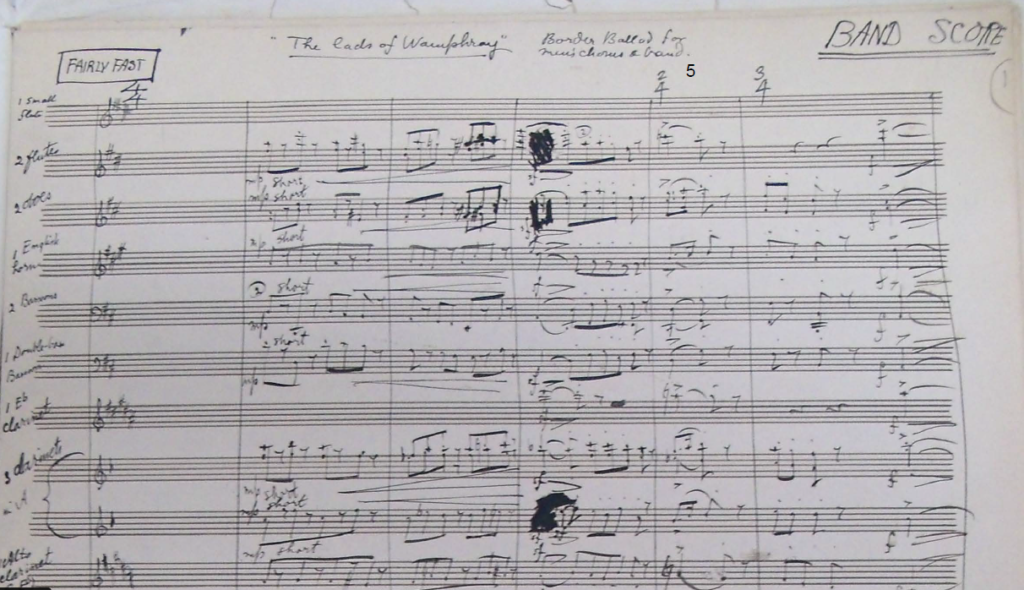
The Lads of Wamphray gave Grainger the opportunity to create music that celebrated folk of a rustic background, a theme that he would pursue throughout his career. As an Australian, Grainger was looked down upon by the British upper-crust society; having only received about 3 years of formal education, Grainger considered himself “a product of non-education.” He would be exploited, to an extent, by the London upper class during his 1901-1904 London career as a “salon pianist,” a circumstance he deeply resented. He would also later claim to thoroughly enjoy the austere life of a U.S. Army Private First Classbandsman from June 1917 – January, 1919 (“it suits me right down to the ground”).
This same admiration for self-educated and working-class folk was part of the attraction that led him to collect folk songs from English working class people, farmers, and old-timers living in the poorhouse. He respected their musicianship and artistry, and viewed folk art as providing unlimited encouragement for the demonstration of individuality by the performer.
“If a folk singer has a voice with a wide tonal range he freely extends melodies to show off the full compass of his voice. Conversely, a voice with a small range necessarily narrows the compass of his tunes.”
Grainger set three works of Scott’s for a variety of settings – The Lads of Wamphray Ballad (and, during the same period, The Lads of Wamphray March); The Twa Corbies; and Lord Maxwell’s Goodnight (a setting of selected portions of the ballad “Lord Maxwell” from Scott’s Minstrelsy). In addition to the Border Ballads collected by Scott, Grainger also set “faux Border Ballads” of Algernon Charles Swinburne (1837-1909), the Pre-Raphaelite author and poet who wrote contemporary verse in the style of Scott’s Border Ballads. In 1916 Grainger would cast Swinburne’s The Bride’s Tragedy as a major work for large orchestra and double chorus.
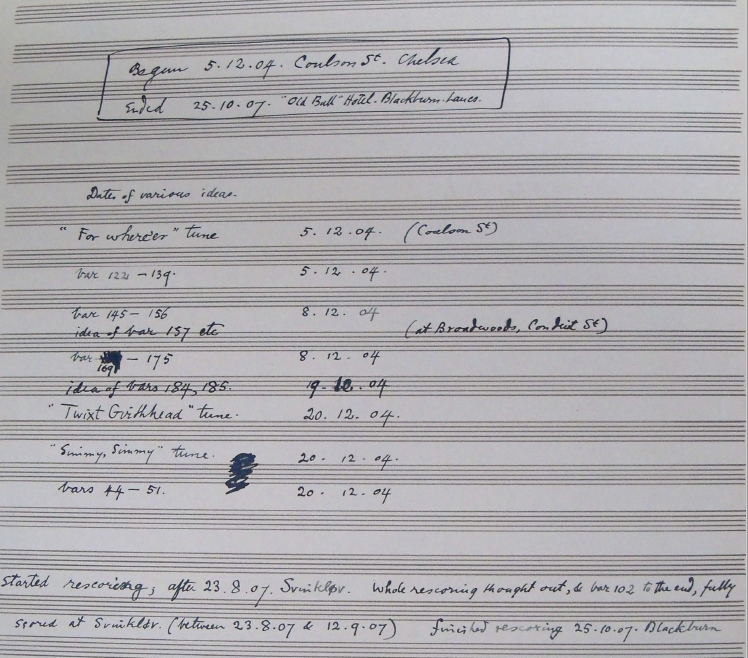
Grainger wrote The Lads of Wamphray Ballad in a typical Grainger “white heat” (he would later estimate that he never spent more than eight days a year composing…). The music was written in 4 days between December 5 and 20 of 1904 (he would have been 22) and scored between August 23 and September 12 of 1907, with final touches rendered on October 25, 1907.
We’ve now seen how encouragement and support from his friend Karl Klimsch helped Grainger discover and study new resources with the folk music of Scotland. Grainger encountered another “encourager” in Major John MacKenzie-Rogan, Director of the illustrious Band of HM Coldstream Guards. We’ll talk about the Major (and later Lieutenant Colonel) and his role in introducing Percy Grainger to the Wind Band in our next episode of “In a Nutshell.”

